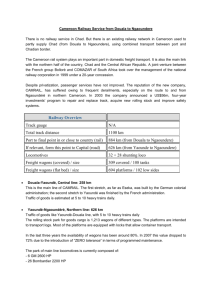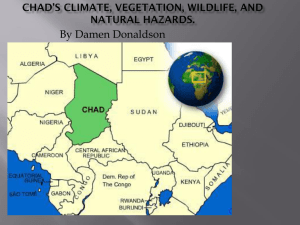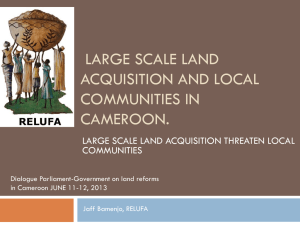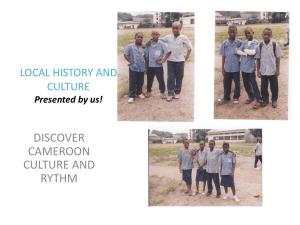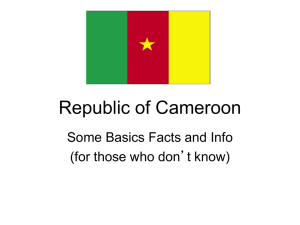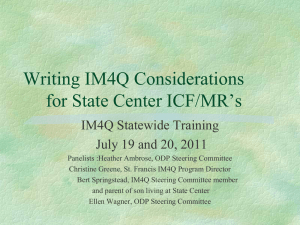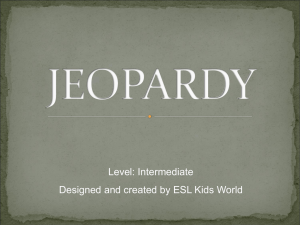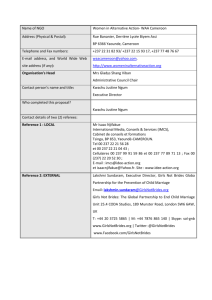Are the risks and returns fair from each party`s perspective?
advertisement
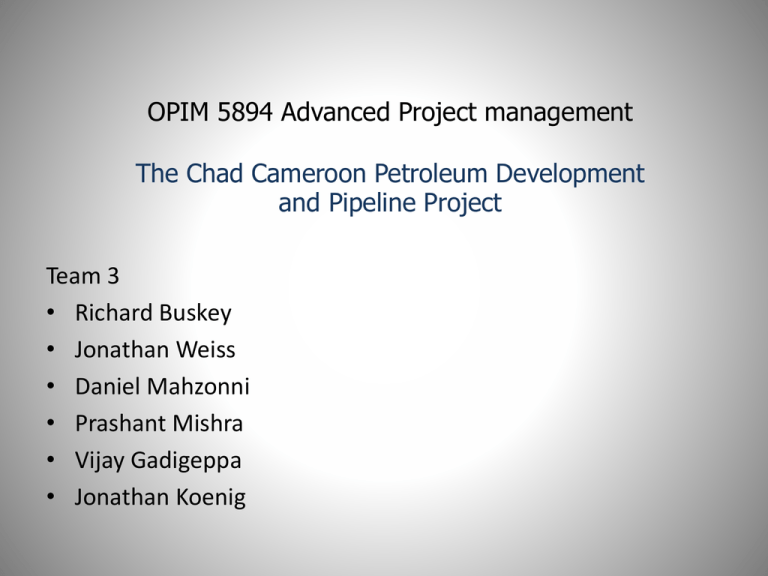
OPIM 5894 Advanced Project management The Chad Cameroon Petroleum Development and Pipeline Project Team 3 • Richard Buskey • Jonathan Weiss • Daniel Mahzonni • Prashant Mishra • Vijay Gadigeppa • Jonathan Koenig Chad Cameroon Petroleum Dev. • How are the sponsors financing this deal? How does the financing of the Field system differ from financing of the Export system? – Equity financing for the Field System • Uncertainty with the Oil extraction • Oil Companies interested in the oil futures; control of oil – Debt financing for the Export System • Certainty with the oil sale profits • Treated as a project Chad Cameroon Petroleum Dev. • Analyze the risks and returns to Chad, Cameroon and the Private sponsors? How were the returns calculated? Are the risks and returns fair from each party’s perspective? – Risks • Environmental Impact • Indigenous People • Long-term sustainability – Risks Mitigation • 5 years of review and public debate: Sponsors came up with contingency plans on almost every aspect of the project – – – – – – – – – – – Waste Management Oil spills Regional development Indeginous people Offsite environment Community health Compensation and resettlement Induced access management Decommissioning Cultural properties Environmental Monitoring & Management Chad Cameroon Petroleum Dev. • Analyze the risks and returns to Chad, Cameroon and the Private sponsors? How were the returns calculated? Are the risks and returns fair from each party’s perspective? – Returns were calculated by • Oil price ($9 to $42 over the last 18 years with an average of $20 / barrel • Volume consumptions (Could vary b/w 595 milion barrels to 1,038 million barrels) – Fairness to each party • Chad – High risk: Environment Impact, Possible re-location of indigenous population – History shows Extraction of Oil does not equal development – Returns: would receive $ 1.8 bill. of cash flow from the project in the form of income taxes, royalties and dividends. • Over the 10 years of production (2004 to 2013), income taxes would represent 16% of the total & royalties and dividends would represent the remainder. Chad Cameroon Petroleum Dev. • Analyze the risks and returns to Chad, Cameroon and the Private sponsors? How were the returns calculated? Are the risks and returns fair from each party’s perspective? – Fairness to each party (Contd.) • Cameroon – Most risk because of the pipeline going thru’ their indigenous population, impact to the environment; » Ground water contamination » Natural reserves, Lob waterfalls getting affected » No new job creation – Gets $ 535 million (based on Transit, Pipeline tax and Share of ROE) Chad Cameroon Petroleum Dev. • What is the World Bank/IFC’s role in this deal? Are they likely to be successful? – World Bank had extensive lending and policy experience with developing countries and had been working with Chad and Cameroon for many years – Project was commercially viable – Project would jump start Chad’s listless economy. – Bank could play an important role in protecting the environment as well as the indigenous people – Likely to be successful • Based on their history and experience • If opportunity is not capitalized, somebody else (Sudan/Libya) would take it over • Most of the risks and issues addressed and mitigated as part of the 5 year project review • Reputation of IFC • Revenue Management Plan Chad Cameroon Petroleum Dev. • Will the Revenue Management Plan work? Are there aspects of the plan that you think should be changed? – Project Revenue: $ 14 bill.; Total distributions = $8 bill. – Chad would receive $ 1.8 bill. of cash flow from the project in the form of income taxes, royalties and dividends. – Over the 10 years of production (2004 to 2013), income taxes would represent 16% of the total & royalties and dividends would represent the remainder. – Govt. would have the discretion over how to spend the income tax revenues as long as they were used for general development purposes. Chad Cameroon Petroleum Dev. • Will the Revenue Management Plan work? Are there aspects of the plan that you think should be changed? – Royalties and dividends would be deposited into a Special Petroleum Revenue account and distributed in the foll. way: • 10% would be deposited in foreign financial institutions and used to finance poverty reduction programs for future generations • Of the remaining 90%, – 85% would be deposited in the Chadian commercial banks and used to finance development programs in 5 high priority sectors – education, health & social services, rural development, infrastructure, environment and water resources – 15% would go to the government budget and programs in the Doba region. Chad Cameroon Petroleum Dev. • Will the Revenue Management Plan work? Are there aspects of the plan that you think should be changed? – Aspects which need to re-visited • Little chance of success without the will of the authorities or the confidence of the population • Did not specify how decisions would be made; voting power would be determined • Not enough representation from the civil society on the oversight committee; likely to be biased based on the government’s actions Chad Cameroon Petroleum Dev. • Would you approve the deal as a World Bank/IFC Board member? – It is an opportunity; studied the project for 5 years and addressed all issues and concerns. – Choice between not doing it or doing it – Rewards outweighs the risks
